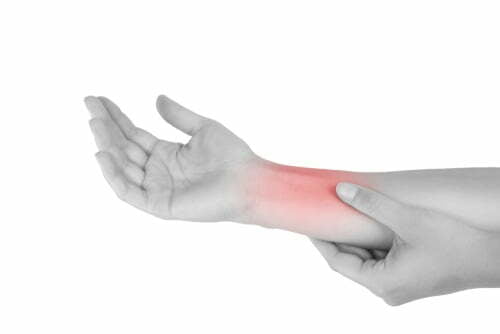
A repetitive strain injury (RSI) is a term that refers to a set of conditions that affects the tendons, tendon sheaths, muscles, joints, and nerves. The condition is caused by repetitive movements or tasks, and sometimes vibrations, rapid movements, forceful exertions, excessive strain, uncomfortable positioning, static loading, or holding the same posture in an unnatural position.
Repetitive strain injury is also referred to as:
- Repetitive stress injury
- Repetitive motion injuries
- Repetitive motion disorder (RMD)
- Cumulative trauma disorder
- Regional musculoskeletal disorder
- Work-related musculoskeletal disorder
- Occupational overuse syndrome
- Overuse syndrome
Where Can You Get Repetitive Strain Injuries?
When you’re dealing with a repetitive strain injury, it can cause recurring or chronic pain throughout specific areas of the body.
Parts of the Body
The most common places to develop repetitive strain injuries include the following:
- Neck
- Shoulders
- Hands
- Wrists
- Forearms
- Biceps
- Elbows
How Do You Know If You Have a Repetitive Strain Injury?
Repetitive strain or stress injuries are caused by continuous damage to your muscles, tendons, tendon sheaths, joints, ligaments, and nerves. Each affected area can produce a variety of different signs and symptoms.
Signs & Symptoms
- Recurring pain
- Numbness or a tingling sensation in the affected area
- Pulsing or throbbing pain
- Tenderness of the joint
- Popping, cracking, or clicking sounds or sensations
- Stiffness or aching
What Kinds of Repetitive Strain Injuries Can You Get?
Repetitive strain injuries are a set of conditions in which the onset is triggered by or attributed to repetitive movement and tasks.
Conditions
Some examples that can lead to repetitive stress injuries include:
- Bursitis
- Tendonitis
- Carpal tunnel syndrome
- Cubital tunnel syndrome
- Radial and ulnar tunnel syndrome
- Tennis elbow
- Golfer’s elbow
- Runner’s knee
- Shin splints
- Stress fractures
- Trigger finger
- Thoracic outlet syndrome

What Causes Repetitive Strain Injuries?
As we said, repetitive stress injuries can occur from repeated motions, forceful exertion, or holding an awkward and uncomfortable position for prolonged periods. Over this duration, microscopic tears can form in your tissue faster than your body can heal them.
Common Causes
The most common causes of a repetitive strain injury can include:
- Repetitive motions
- Texting/using a mobile phone or device
- Playing video games
- Typing on a keyboard and using a mouse
- Poor ergonomics
- Using vibrating equipment
- Holding the equipment in the same posture for extended periods
- Carrying/lifting heavy items
- Playing an instrument
- Sports (tennis, golf, running)
- Poorly fitted sports equipment
How Is a Repetitive Strain Treated?
Treatment options for a strain injury can vary depending on the area affected and the severity of the condition.
Treatment
Treatments involved in repetitive strain injuries can include:
- Anti-inflammatory medication: Ibuprofen, aspirin, and muscle relaxants can be used to reduce pain levels.
- Ice or heat therapy: Using either a hot or cold pack, you can reduce pain or swelling. In many cases, heat therapy is well-regarded for loosening up any stiffness you may be experiencing.
- Splinting: This treatment method can offer support and strength to the area affected.
- Injections: Steroid injections are often used to treat specific conditions.
- Surgical procedures: Considered a last resort, surgery is often needed if all other treatment methods fail.
Physiotherapy
Physiotherapy or physical therapy is a non-invasive treatment option for many common repetitive strain injuries. This method can reduce stress on the affected area, as well as slow down or prevent the worsening of an injury. While the kind of Physiotherapy that you receive will vary based on the severity of the condition, it can include the following:
- Strengthening exercises
- Manual therapy
- Heat therapy
- Therapeutic ultrasound
- Splinting or bracing
- Ergonomic workstation assessment
- Patient education
- Activity modification
Physiotherapy can be both a short and long-term solution for reducing repetitive stress and strain conditions or symptoms. A trained Winnipeg Physiotherapist will look at any areas affected and create a personalized plan to address the pain and discomfort you’re experiencing. Physiotherapy treatment plans can include many of the following benefits:
- Strengthening of the muscles and joints
- Proper posture
- Improved range of motion
- Improved flexibility
- Better muscle endurance
- Boost blood flow
- Prevent further injury
In some cases, your Physiotherapist may recommend massage therapy or acupuncture to help relax your muscles and alleviate symptoms.
How Do I Prevent Repetitive Strain Injuries?
Repetitive strain injuries won’t just go away on their own. During your Physiotherapy treatment, you will learn the proper techniques to minimize the risk of further injuries and symptoms associated with repetitive strains.
Techniques
The techniques you will learn are as follows:
- Stretches and exercises for muscles and joints
- Stretches to perform throughout your day, especially if you sit for lengthy periods
- Maintaining proper posture, especially while working or performing the activity involved in your repetitive strain injury
- Proper lifting techniques
For many individuals, simply stopping the aggravating activity that caused the strain or stress may not be a possibility. In that instance, try these specific tips:
- Take frequent breaks, especially when sitting all day.
- Set up an ergonomic workstation.
- Maintain the proper posturing.
- Keep your lifestyle healthy by eating right and exercising regularly.
Repetitive strain and sprain injuries can be debilitating and keep you from living your daily life. You don’t have to live with that pain anymore. Book an appointment with our Winnipeg physiotherapy clinic today, where one of our trained Physiotherapists can assess your specific needs and create a treatment plan that works for you.



